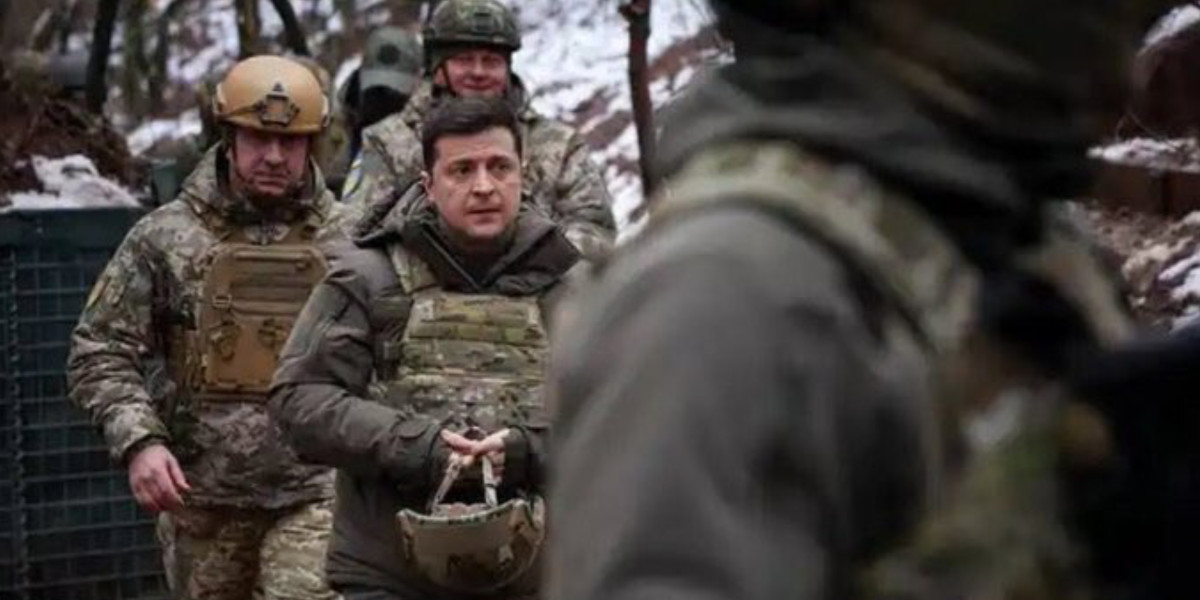In the picture
Ukrainian President Zelensky reviews troops after the start of the Russian invasion [Ukrainian Government].
After weeks of speculation and holding its breath, the world has witnessed the beginning of Russian aggression on Ukraine's already wounded territory. In the early hours of 24 February, Russian military forces crossed the border and attacked its neighbour from several directions, using several operational domains.
With doubts about the factual invasion removed, new questions arise: what will be its scope, will Ukraine be able to resist the Russian onslaught, how will the international community in general, and the West in particular, react?
It is not possible to predict what will happen and to give a categorical answer to these and other equally pressing questions. However, it is possible to offer some reasonable possibilities based on an analysis of status and the actors involved. resource To do so, it is necessary to consider first of all what goal might have moved Putin to take this long-announced step, but which it was thought could be aborted through diplomacy or the threat of sanctions.
Russia's goal with regard to Ukraine is none other than to ensure, once and for all, that the country remains within the space it considers its 'sphere of influence'. This requires a change in President Zelensky's attitude or, better still, a change of government to install an authority in Kiev that is close to Russia's postulates. Russia's actions will be linked to the achievement of this goal, on the understanding that what is at stake for Moscow is a vital security interest.
If the attack is a resounding success and the Ukrainian government and resistance collapse, it is plausible to think that Russia will maintain its presence in the already partially occupied regions of the Donbas, whose independence it has recognised, integrating them de facto into Russia, perhaps extending that presence to provide a land bridge to the Crimean peninsula, even to the border of the Dnieper, and dividing Ukraine into a part under direct Russian rule and a nominally independent, but Finnish-controlled, Finnishised part.
If, on the other hand, the Ukrainian resistance were to prove capable of hindering Russian activity - which seems unlikely - then Russia could be forced into a massive occupation of the country with unpredictable consequences, but very costly in economic terms and in terms of human and material resources, and which could generate significant movements of refugees and displaced persons.
Regardless of the final result of the aggression, some realities are dawning before the spectator. The most immediate, perhaps, is that the predictions of all those in the academic and professional spheres who have been announcing the end of the Clausewitzian war and the dawn of a new paradigm of warfare have not been entirely accurate. result After years of preaching the advent of "new wars" and "wars among the people", we find ourselves with a conflict - at least as far as we can see at the moment - quite classic, with motives and objectives that the Prussian thinker would easily recognise and with conventional means reinforced, yes, by today's technology. Something similar can be said of the old postulates of geopolitics, which many have considered to have been superseded by the liberal order, but which clearly continue to inspire many actors in the international system.
It is still too early to know how the international community, and more specifically the West and NATO, will respond. Initial statements from the leadership of the European Union and other European countries speak of the unacceptability of Russian aggression and unconditional support for Ukraine, but offer little more than military financial aid to Kiev - presumably by sending arms and equipment - and a severe sanctions regime whose scope is yet to be defined, which will harm both sanctioned and sanctioning parties, and whose prospect has not been able to dissuade Putin, who is probably looking for ways to circumvent them.
In such a volatile status , there is a possibility that a neighbouring Atlantic Alliance member might take defensive action that could be perceived by Russia as aggression, or that a miscalculation could draw NATO into the conflict in direct application of article 5 of the Washington Treaty. To prevent this, the Alliance has reinforced its military presence in the allies most affected by the Russian threat and activated its defence plans.
The long shadow of nuclear weapons hangs over this war. It is likely that, without them, Western engagement with Ukraine would have been different than it is now. The possibility of nuclear escalation is simply unacceptable. In counterfactual history, we might also ask whether the invasion would have been possible with a nuclearised Ukraine as it existed until 1994. The answer is clear to today's proliferators.
Beyond Ukraine, what is at stake in this war is the survival of the international order resulting from World War II which, despite its flaws, has generated so many years of global stability and prosperity, but which Russia perceives as advantageous to the United States, which would have abused it at the end of the Soviet era, and detrimental to its security interests. By his decision, Putin shows no respect for the principle of sovereignty on which such an order is based. Worse, he seems to have detected weakness in the United States which, for the time being, in retaliation, is offering only a sanctions regime that Russia seems to scorn. The stakes are high that Russia does not succeed in its aggression.
* A shorter version of this text was published in Diario de Navarra.

